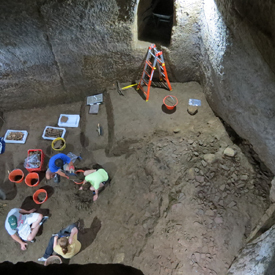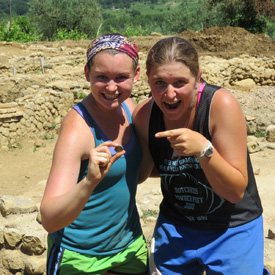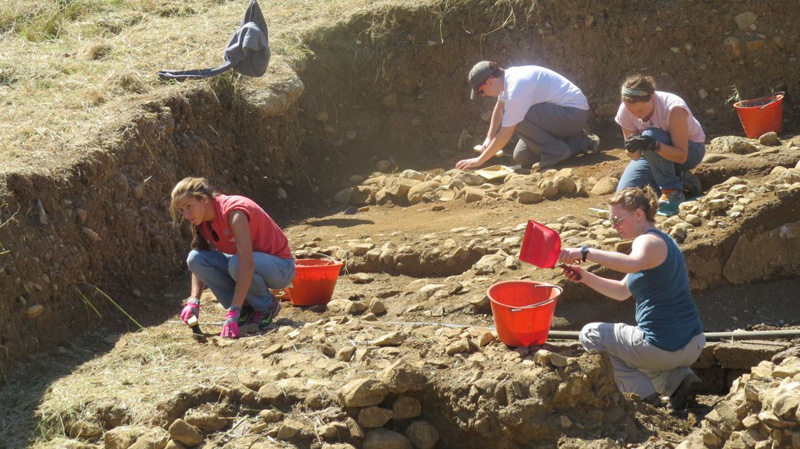THe Project

During the summer of 2017, you may volunteer for excavating in Italy with the Coriglia/Orvieto Excavation Project, an international archaeological project sponsored by the Department of Classics at Saint Anselm College. This archaeological expedition is part of a long-term project to excavate several sites in and near Orvieto. This season (May 22 – July 1, 2017), we will be working at three sites: one is an Etrusco-Roman settlement approximately 8 miles from Orvieto, the second is a 2500 year old Etruscan pyramidal hypogeum deep below the city of Orvieto and the third is the major Etruscan necropolis of Orvieto, Crocifisso del tufo.
The city of Orvieto is located in a dramatic setting atop a large tufa plateau with sheer 600 feet high cliffs that encircle the plateau on all sides. The plateau has been continuously inhabited from the 10th century BCE. Its original urban inhabitants were the Etruscans. Our site, an underground Etruscan cave on the southwest side of the city, offers a unique opportunity to study artifacts from the mid 5th c. BCE. Most of the finds have a religious connection which points to some type of ritual disposal. The focus this season will be on systematically excavating a 2 meter high heap of pottery and other materials.
 Near Orvieto is the site of Coriglia where volunteer archaeologists will share in the exciting excavation of an ancient settlement that is located immediately below the crest of Monterubiaglio overlooking the Paglia River Valley. The entire area is dotted with ancient Etruscan and Roman architectural remains. Many museums throughout Italy and the United States possess artifacts discovered in this region. Coriglia has yielded sculptures, mosaics, coinage, inscriptions, ceramics, frescoes and many other objects associated with daily life of the Romans and Etruscans.
Near Orvieto is the site of Coriglia where volunteer archaeologists will share in the exciting excavation of an ancient settlement that is located immediately below the crest of Monterubiaglio overlooking the Paglia River Valley. The entire area is dotted with ancient Etruscan and Roman architectural remains. Many museums throughout Italy and the United States possess artifacts discovered in this region. Coriglia has yielded sculptures, mosaics, coinage, inscriptions, ceramics, frescoes and many other objects associated with daily life of the Romans and Etruscans.
The 2006 to 2016 excavations have revealed a large Etruscan settlement (7th cent BCE) with its religious center likely dedicated to a healing god, followed by a larger Roman settlement and in the early Empire by a very large shrine/bath complex. Thus the site was occupied from about 800 BCE to at least AD 600. The persistence in occupation and in use of the site indicates its importance. Yet a number of questions about the extent and nature of the site remain. This season we will attempt to understand how the various excavated structures relate to each other.
APPLICATION PROCEDURES AND COSTS
The project accepts volunteers with or without prior archaeological experience. While knowledge of Italian is useful, it is not required. Volunteers must be at least eighteen years of age (17 with parental consent) and must be in good health. The cost to participate in the six-week archaeological project is $3600 ($600/week). This fee covers your room and board. The fee does not cover airfare, tuition, travel to/from the airport or trips that students take on their own.
1) All volunteers must provide proof of medical insurance (a Xerox copy of an up-to-date insurance card).
2) All volunteers must have a valid passport and provide a copy of the first page to the director by May 1st.
3) All documents must be completed by May 1st.
4) The complete participation fee of $3600 for six weeks ($600 per week) must be paid by the final due date (May 1st).
Checks should be made payable to “Institute for Mediterranean Archaeology” and mailed to:
Professor David B. George
Department of Classics
Saint Anselm College
Manchester, NH 03102
COURSE CREDIT
Optional course credit. For an additional fee, students may earn 4 or 8 course credit hours in the archaeological field school by registering through the Saint Anselm College Summer School. Letter grades will be assigned for CL380 Archaeological Fieldwork.
TRAVEL TO AND FROM THE PROJECT
The 2017 excavation season is a six-week project that will extend from May 22nd – July 1st. Volunteer archaeologists should plan to arrive in Orvieto on Monday, May 22nd. The first few days will consist of orientation sessions and preparation of the sites for our excavations. The minimum stay is four weeks. Arrangement for a different arrival date must be cleared with the director.
The project will coordinate getting volunteers to the dig house. For those arriving on May 22nd, an airport van service from the Rome airport to Orvieto is available. The cost of this dig-arranged travel averages $30 and will transport you directly from the airport to the dig house. If you choose rather to arrive on your own by train, we will pick you up at the Orvieto station. At the end of the project, because of the varied travel arrangements, students will plan their own departure from Orvieto. We will assist in taking people to the train station in Orvieto.
The excavations will cease on June 30th. Volunteers are expected to work on Friday, June 30th. Please note that the night of June 30th (Friday) will be the last night that volunteers for our project may stay at the convent. All volunteers will have to depart their rooms on July 1st (Saturday).
GENERAL INFORMATION
ROOM AND BOARD
Volunteers will stay at the S. Lorenzo in Vineis Convent (a 10th century monastery) or the ex-Scuola in Tamburino. Both are located just down the hill, a 15 minute walk from Orvieto. Breakfast will be provided at both residences, lunch 'in the field' and dinner at the convent. The dinner menu is “set” but vegetarian meals will be made available on request. Meals are not served on Saturday or Sunday, but the convent kitchen is stocked with food for all participants. Both residences have a laundry machine and drying racks. Participants will be assigned general housekeeping and meal duties on a rotating basis. At the end of the dig, participants are expected to help with cleanup, particularly their own rooms.
WEEKDAY SCHEDULE
Monday through Friday our wake-up call for fieldwork or lab is 7:00 AM. Breakfast ends at 7:20 AM. We leave for the sites at 7:30 AM. Work is scheduled from 8:00 AM to 5:30 PM. Lunch will be from 12:00 to 1:00 PM "in the field." At 7:00 PM, the group will meet for dinner in the Convent cloister. Dinner and lectures are mandatory. Excavations normally extend from Monday through Friday. However, if a regular workday is lost due to rain, work may occasionally continue through part of Saturday.
PHYSICAL DEMANDS
The physical labor at the project will vary, but you can expect physical demands due to the long day in the field. All volunteers will be excavating with a variety of hand tools and there will be moderately heavy lifting (movement of soil), as at any archaeological site. The program is rewarding but all who participate should possess enthusiasm and stamina to profit from six weeks of hard work.
WEEKEND TRAVEL
We try to keep weekends free so that students can explore Italy. Orvieto's central location allows for easy access to most points of interest in Italy; it is an hour from Rome, an hour and a half to Florence by train. Participants may travel where they wish at their own expense, but must provide an itinerary and contact information on the weekly signout sheet.
WEATHER CONDITIONS
In the month of May volunteers should expect the mornings to be cool with occasional showers. In June the weather becomes warmer and the sun can be very hot. Because we will be outside most of the day, precaution should taken, especially the use of sunscreen (SPF 30 or higher). Safety in the field is one of our greatest concerns and you will hear the staff constantly reminding you to “drink water” and “wear your hat”. See the table below for a list of must-have items:
| Important Dates | Must-Have Check List | |
|---|---|---|
09/21 Information Meeting (Alumni 7 at 7pm) |
|
.
